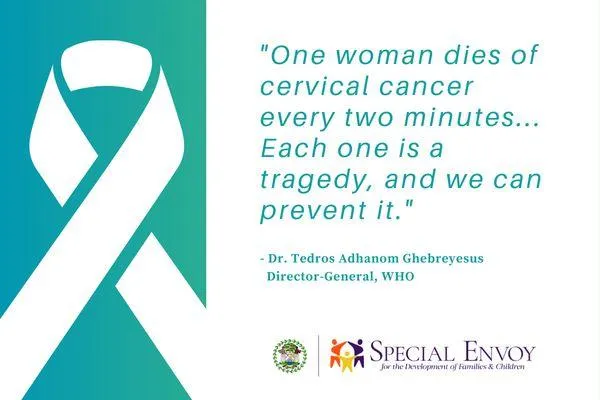Welcome to Our Blogs
INCREASE YOUR AWARENESS
Follow along as we share valuable knowledge and content to enrich and empower your everyday life.

Cervical Cancer
Overview
Risk Factors
Signs & Symptoms
Treatment
Prevention Methods
What is Cervical Cancer?
The cervix is a part of the female reproductive system and is the opening between the womb (uterus) and the vagina (birth canal). Cervical cancer refers to the growth of abnormal cells (cancer) in the lining of the cervix. The most common cervical cancer is squamous cell carcinoma, accounting for 70% of cases, and Adenocarcinoma is less common (about 25% of cases) and more challenging to diagnose because it starts higher in the cervix (Cancer Council, 2023). Cervical cancer usually grows very slowly with the average age at diagnosis being 49 years old. Still, cervical cancer can happen at any age and should be screened for as a part of a woman’s basic and preventative health care.
Risk Factors Associated with Cervical Cancer

Although many factors can increase a woman’s risk of developing cervical cancer, one of the main risks is persistent infection with some high-risk types of HPV (Human Papillomavirus). This is the reason that having many sexual partners or a partner who has HPV or many sexual partners increases a woman’s risk for developing cervical cancer because it is likely to result in persistent HPV infections.
Smoking is the other main risk factor for cervical cancer because it causes damage to the DNA in cervical cells. STI such as chlamydia is also a risk factor for cervical cancer because it may help HPV to grow and live on the cervix. While long-term use of oral contraception has also been linked to an increased risk for cervical cancer, it has been shown to be safe and effective in preventing ovarian cancer.
Multiple full-term pregnancies can also increase a woman’s risk of cervical cancer because of the hormonal changes or weakening of the immune system associated with pregnancy. Having a weakened immune system or HIV/AIDS also increases cervical cancer risk because it enables the cancer cells to multiply without detection or intervention from the immune cells.
Signs & Symptoms of Cervical Cancer
Precancerous changes in cervical cells rarely cause symptoms. However, when it does cause symptoms it can include:
Vaginal bleeding between periods
Menstrual bleeding that is longer or heavier than usual
Pain during intercourse
Bleeding after intercourse
Pelvic pain
A change in your vaginal discharge such as more discharge or it may have a strong or unusual colour or smell
Vaginal bleeding after menopause
While these symptoms can be related to varying conditions or diseases, it is important to talk to your doctor and get routine checkups for cervical cancer whether you have one, all, or no symptoms.
Treatment Options for Cervical Cancer
Typically treatment for CC involves radiotherapy, surgery, and/or chemotherapy depending on the stages.
Surgery: Doctors remove cancer tissue in an operation.
Chemotherapy: Using special medicines to shrink or kill the cancer. The drugs can be pills you take or medicines given in your veins, or sometimes both.
Radiation: Using high-energy rays (similar to X-rays) to kill the cancer.
There is no availability for radiotherapy in Belize, however, the options for surgery and chemotherapy are readily available.
How Can Cervical Cancer Be Prevented?
The primary method for preventing cervical cancer is by getting the HPV vaccine, having regular screening tests, and going to the doctor if your screening test results are not normal.
Human Papillomavirus (HPV) Vaccine
The HPV vaccine protects against the types of HPV that most often cause cervical, vaginal, and vulvar cancers.
The HPV vaccine has been available in Belize since 2016 and is fully funded by the Government of Belize.
HPV vaccination is school-based and administered to standard IV students both girls and boys 10 years and older.
As little as one dose of the HPV vaccine has been shown to be effective in protecting against HPV infections.
While HPV vaccination prevents new HPV infections, it does not treat existing infections or diseases. Therefore, the HPV vaccine works best when given before any exposure to HPV.
Screening Tests for Cervical Cancer
Belize has a triage of screening tests available for cervical cancer detection. These screening tests help to find changes that could become precancer or cervical cancer.
HPV Test looks for the virus (human papillomavirus) that can cause these cell changes.
Papanicolaou Smear (Pap Smear) looks for precancers, cell changes on the cervix that might become cervical cancer if they are not treated appropriately.
Visual Inspection with Acetic Acid (VIA) also called cervicoscopy, consists of naked-eye visualization of the uterine cervix (without magnification) after the application of diluted acetic acid, to screen for cervical abnormalities.
These screening tests can be done in a doctor’s office or clinic. It is recommended that women over the age of 21 get screened with a pap smear every 3 years and get screened every 5 years with an HPV test. You should get screened for cervical cancer regularly, even if you received an HPV vaccine.
Sources:
Cancer Council. (2023). Cervical Cancer.
https://www.cancer.org.au/cancer-information/types-of-cancer/cervical-cancer
CDC. (2022). How Is Cervical Cancer Diagnosed and Treated?https://www.cdc.gov/cancer/cervical/basic_info/diagnosis_treatment.htm#:~:text=it%20has%20spread.-,Treatments%20include%20surgery%2C%20chemotherapy%2C%20and%20radiation%20therapy.,your%20veins%2C%20or%20sometimes%20both.
CDC. (2022). What Can I Do to Reduce My Risk of Cervical Cancer? https://www.cdc.gov/cancer/cervical/basic_info/prevention.htm#:~:text=The%20most%20important%20things%20you,test%20results%20are%20not%20normal.
@ Copyright 2026 - Special Envoy for the Development of Families & Children| All rights reserved

